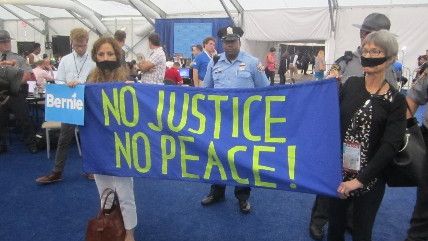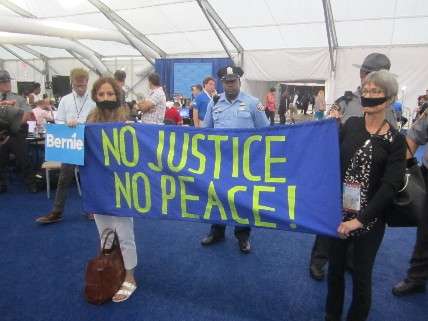Sorry, It's Still Not 1968: DNC/RNC Protesters and Police Prove Dissent and Order can Coexist
Apocalyptic predictions of violence and brutality foretold a reality of peaceful dissent and cooperative law enforcement.


The major parties' political conventions have now come and gone without the much-feared riots, mass arrests, and bloodshed predicted by so many among the chattering classes. References to the notorious 1968 Democratic National Convention (DNC) — where anti-war protesters were gassed and beaten by Chicago police while the Democratic Party tore itself apart on the convention floor over the Vietnam War — were to be found all over media previews of the conventions last month.
Prior to the conventions, Politico reported the results of an anonymous survey taken by Republican "swing-state operatives, activists and strategists" who offered the following predictions of what they expected from the Republican National Convention (RNC) in Cleveland:
- "It's really more a matter of how bad it will get."
- "The reaction and counter-reaction to the resurgent identity politics gripping the country's politics make at least some clashes and mayhem a near certainty…"
- "It's simply too big of a target for the malcontents and violent left to miss…"
- "…the far-left agitators in Cleveland will make the 1968 Democratic Convention in Chicago look like a fourth-grade slap fight."
- "[G]iven the mood of the country the last three weeks, someone is gonna get hurt."
As it happened, the protests in Cleveland were very small, never numbering more than a few hundred and mostly populated with ineffectual groups of demonstrators such as bizarro-Christian hatemongers and unreconstructed communists. In Philadelphia the crowds were much larger, at least at first, when thousands of protesters took the streets in various marches last Sunday and Monday. Some of this can be owed to the fact that Cleveland is much harder to reach than Philadelphia, which is within just a few hours of a number of large metropolitan areas and easily accessible by train. It's hard to whip up a great amount of unrest if nobody shows up.
Another reason Cleveland was not the much-expected end of days is because protests were relegated to special zones far from the RNC's main stage at Quicken Loans Arena, and the sheer numbers of uniformed and undercover officers in the downtown area was simply overwhelming. That's how you end up with the week's largest protest march being viewed by no one who wasn't in law enforcement or media, and how you end up with hundreds of story-deprived journalists waiting for an hour to see an American flag burn.
But even in the City of Brotherly Love, arrests were rare and protests grew smaller throughout the week, perhaps due to the sweltering temperatures and humidity that pushed the heat index to over 100 degrees for most of the week. Also, both the city and the police made it a point to accommodate protests, unlike when Philadelphia hosted the RNC in 2000 and police infiltrated protest groups and incarcerated demonstrators were held under punitively high bails.
A pro-marijuana legalization march I attended last Thursday included several shout-outs of gratitude to the police for keeping them safe, and even a dig at the anarchists who the night earlier had breached the security perimeter outside the DNC in what the self-described pothead activists called a deliberate attempt to make the police look bad. Those anarchists were among the very few DNC protesters to be arrested the whole week, with police issuing about 100 civil citations (which come with a $50 fine and no record of arrest) to unruly demonstrators during the run of the convention.
Much of the unrest to be found at the DNC was within the Secret Service-controlled grounds outside the Wells Fargo Center. Last Tuesday, following the official roll call vote which culminated in Hillary Clinton's nomination for president, hundreds of Bernie Sanders delegates walked out of the arena, and about a hundred of them made it into the media tent before law enforcement was able to secure the doors again. But other than some chanting and arguing both inside and out of the tent, that was the extent of the hubbub. Anger was expressed peacefully, law enforcement ensured people weren't trampled, and then everybody went about their business. The fact that the Bernie or Bust crowd's brief occupation of the media tent was the high water mark of intra-party protest at the DNC is a testament to the level of civility in expressions of dissent last week.
I'll admit to feeling a little under-dressed for the convention when I heard Washington Post reporters were being issued flak jackets, helmets, and gas masks for the RNC, but when it came down to it, the biggest threat I faced was to my sanity thanks to the non-stop saxophone-playing by a Cleveland street performer underneath my window as I tried to work.
There can be no doubt that this is an exceptionally tumultuous election season, with the apocalyptic demagoguery of Donald Trump being countered by those who see the next in Hitler in the orange-hued face of the real estate tycoon. It is also reasonable that people are on edge given the recent highly-publicized spate of police shootings of civilians, the massacre of police in Dallas, and the horrific terror attack on civilians in France.
Still, few were betting on convention stories of peaceful protests and cooperative cops serving and protecting citizens, including the much-feared agitators. Perhaps it's a fool's errand to look for deeper meaning in the fact that the doom-and-gloom predictions of violence at the conventions didn't pan out. But perhaps it's something to recall the next time the conventional wisdom declares disaster is both inevitable and imminent.


Show Comments (24)